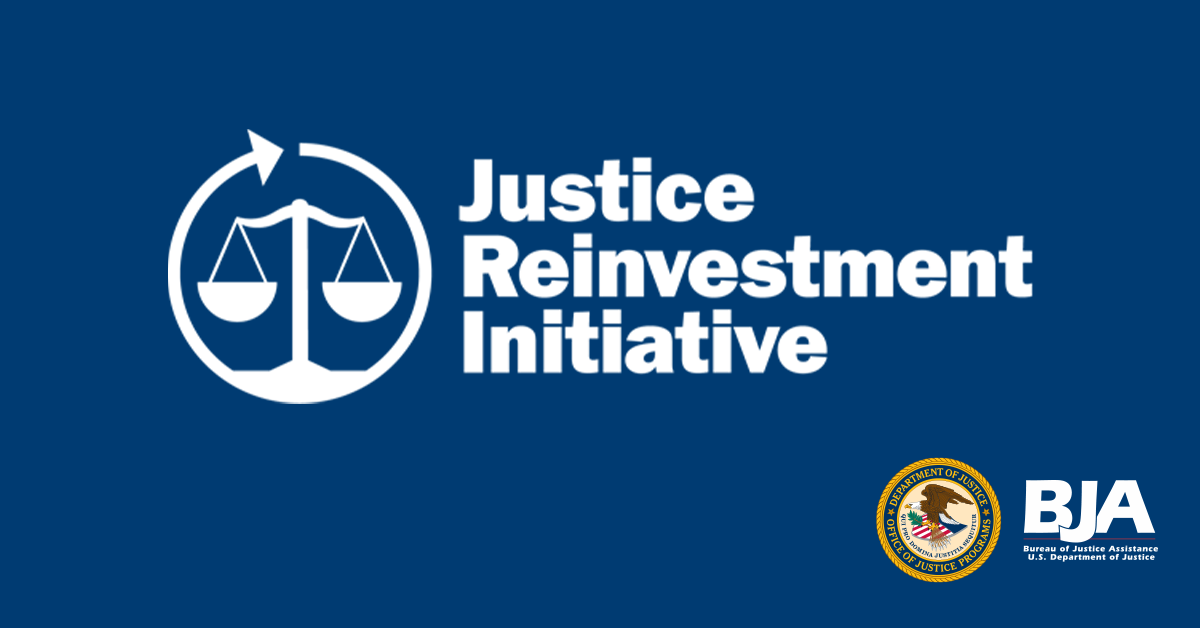The Justice Reinvestment Initiative (JRI) is funded by the Bureau of Justice Assistance (BJA)—with support from The Pew Charitable Trusts (Pew) and Arnold Ventures—and utilizes experts from The Council of State Governments (CSG) Justice Center and the Crime and Justice Institute (CJI) to provide state leaders and stakeholders with the following:
- A collaborative process that engages and builds consensus with a wide range of state and local stakeholders and system leaders
- System-spanning data analysis to understand large-scale challenges, namely the drivers of prison and jail admissions, recidivism, and corrections costs, as well as more focused concerns such as returns to prison and jail from community supervision and high utilization of behavioral health and criminal justice resources by specific populations
- In-depth assessments of current statutes, policies, and practices to provide context for the data
- Clear and compelling findings that identify areas for improvement or innovation
- Stakeholder engagement to learn about on-the-ground dynamics and inform findings and recommendations
- Multiagency implementation support, including training, performance measurement and quality assurance, and the opportunity to apply for funding to seed successful implementation
State-level JRI
How States Have Used JRI
- Georgia and Utah analyzed key policy and decision points to safely minimize the use of incarceration and increase the use of alternatives that reduce recidivism.
- Arkansas and Oregon established multisystem initiatives to better address underlying behavioral health needs of people in the criminal justice system while avoiding duplication of services and reducing reliance on jails for behavioral health treatment.
- Montana and Tennessee increased the use of data-driven decision-making, improved the quality of supervision policies and practices, and expanded access to effective, research-based programs and services.
- Vermont analyzed disproportionate impacts based on race and ethnicity within the justice system to identify opportunities for policy and practice changes that reduce disparities.
- Mississippi and Nevada managed costs associated with state prison and local jail populations and reinvested in programs and practices that research shows can improve safety and health outcomes.
Launching a JRI
- Orientation Meetings
States may contact any project partner to learn more or get started. CSG Justice Center or CJI staff meet with state leaders to discuss the JRI process and the state’s objectives. These meetings include leaders in corrections and community supervision agencies, the governor’s office, the legislature, and the judiciary as well as other key stakeholders based on the objectives. As part of this process, CSG Justice Center or CJI staff assess the state’s readiness to undertake JRI, including the capacity to collect, share, and analyze data across key points in the criminal justice system. - Expression of Interest and Approval
Once committed to using a JRI approach to tackle state criminal justice challenges, leaders from all branches of state government must indicate their commitment to receiving intensive JRI technical assistance by submitting signed letters of interest to JRI funders. BJA, Pew, and Arnold Ventures then review each state’s expression of interest, the proposed scopes of work for JRI, and the CSG Justice Center’s or CJI’s recommendations to determine project and funding approval. - Working Group or Interagency Task Force Creation
Approved states establish a committee to guide the JRI effort. While states may tailor the composition and leadership of their committee to meet their needs, all committees should include representatives from all three branches of government and key criminal justice stakeholders. - Data Sharing and Analysis
States enter into formal data use agreements with either the CSG Justice Center or CJI to make as much data available as possible, including case-level data that cover arrests and criminal history, sentencing, jails, prison, probation and parole supervision, and behavioral health. These data must include basic demographics to ensure that CSG Justice Center or CJI staff can conduct a comprehensive analysis and present findings to the appointed committee. - Project Phases
The first phase of a JRI project, which includes data analysis, stakeholder engagement, and the development of recommendations for changes to policy and practice, can take up to a year and culminates in legislative or administrative adoption of recommended policy changes. States may then request continued assistance through a second phase to support the implementation of new policies and practices and track their impact. With approval and funding from BJA, experts from the CSG Justice Center and CJI are available to partner with states for an additional 12–24 months to help states achieve full implementation.
Site-based JRI
Since 2018, the site-based program provides funding for jurisdictions to use the JRI process to address persistent or emerging crime and public safety problems, or to remove impediments to directly addressing them. BJA’s Justice Reinvestment Initiative: Reducing Violent Crime by Improving Justice System Performance program employs the Justice Reinvestment approach which recognizes that every justice agency has a role to play in preventing crime, apprehending and prosecuting perpetrators, ensuring efficient and effective court and pretrial decision-making, facilitating appropriate sentencing and treatment, and protecting community security. Grantees develop and implement innovative approaches to improve the efficacy of state, local, and tribal justice systems.
State, local, and tribal jurisdictions are eligible to apply for grant funds and to receive technical assistance to implement funded projects. Current projects seek to improve court processing and efficient docket management, improve pretrial operations, and develop innovations in information sharing. See the Funding section for opportunities.
For more information on JRI policies, state approaches, and to request JRI technical assistance, please visit:
https://justicereinvestmentinitiative.org/.



